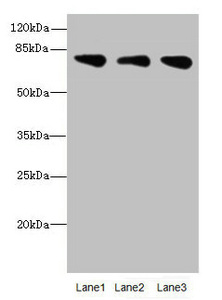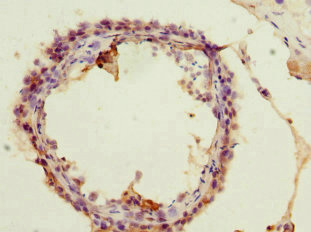Full Product Name
Rabbit anti-Homo sapiens (Human) ACSS2 Polyclonal antibody
Alternative Names
ACAS2 antibody; AceCS antibody; Acetate CoA ligase antibody; Acetate thiokinase antibody; Acetate--CoA ligase antibody; Acetyl CoA synthetase antibody; Acetyl Coenzyme A synthetase 2 (ADP forming) antibody; Acetyl coenzyme A synthetase cytoplasmic antibody; Acetyl-CoA synthetase antibody; Acetyl-coenzyme A synthetase antibody; ACS antibody; ACSA antibody; ACSA_HUMAN antibody; ACSS2 antibody; Acyl activating enzyme antibody; Acyl CoA synthetase short chain family member 2 antibody; Acyl-activating enzyme antibody; Acyl-CoA synthetase short-chain family member 2 antibody; Cytoplasmic acetyl coenzyme A synthetase antibody; cytoplasmic antibody; MYH7B antibody
Species Reactivity
Human, Mouse
Immunogen
Recombinant Human Acetyl-coenzyme A synthetase, cytoplasmic protein (462-701AA)
Immunogen Species
Homo sapiens (Human)
Purification Method
Antigen Affinity Purified
Concentration
It differs from different batches. Please contact us to confirm it.
Buffer
PBS with 0.02% sodium azide, 50% glycerol, pH7.3.
Tested Applications
ELISA, WB, IHC
Recommended Dilution
| Application |
Recommended Dilution |
| WB |
1:1000-1:5000 |
| IHC |
1:20-1:200 |
Storage
Upon receipt, store at -20°C or -80°C. Avoid repeated freeze.
Lead Time
Basically, we can dispatch the products out in 1-3 working days after receiving your orders. Delivery time maybe differs from different purchasing way or location, please kindly consult your local distributors for specific delivery time.
Usage
For Research Use Only. Not for use in diagnostic or therapeutic procedures.





